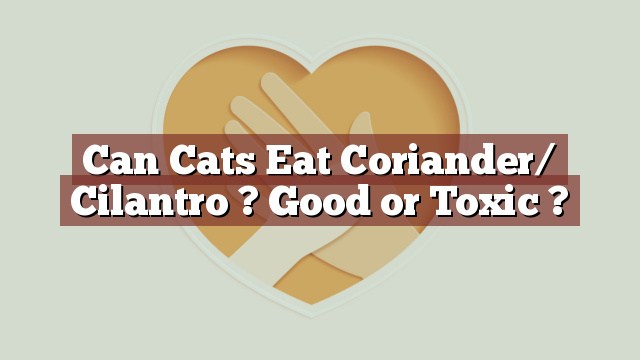Can Cats Eat Coriander/ Cilantro?
As responsible pet owners, it is crucial to be well-informed about the foods that are safe for our feline companions. While cats have specific dietary requirements, it is natural to wonder whether they can indulge in certain human foods, such as coriander or cilantro. In this article, we will explore the nutritional value of coriander/cilantro, whether it is safe or toxic for cats, the potential risks and benefits associated with its consumption, and what steps to take if your cat happens to eat coriander/cilantro.
Nutritional Value of Coriander/Cilantro: Vitamins, Minerals, and More
Coriander, also known as cilantro, is a popular herb that is commonly used in culinary dishes worldwide. It is rich in essential vitamins and minerals that are beneficial to humans. Coriander contains high levels of vitamin A and vitamin K, which are vital for maintaining healthy eyesight, immune function, and blood clotting. Additionally, it is a good source of vitamin C, calcium, iron, and dietary fiber.
Is Coriander/Cilantro Safe or Toxic for Cats? Expert Opinion
Cats can indeed eat coriander or cilantro without experiencing any significant adverse effects. According to veterinary experts, coriander is not considered toxic to cats. However, it is important to note that cats are obligate carnivores, which means that their diet primarily consists of meat. While coriander can be safe for cats, it should only be provided as an occasional treat rather than a regular part of their diet.
Potential Risks and Benefits of Cats Consuming Coriander/Cilantro
When it comes to the potential risks of cats consuming coriander or cilantro, there are no known dangers. However, some cats may have individual sensitivities or allergies to certain foods, including herbs like coriander. In such cases, it is essential to monitor your cat for any signs of digestive issues, such as vomiting or diarrhea, after consuming coriander.
As for the benefits, coriander can offer some health advantages for cats. The fiber content in coriander can help regulate their digestive system and prevent constipation. Moreover, the antioxidants present in coriander may contribute to overall immune system support.
What to Do if Your Cat Eats Coriander/Cilantro: Steps to Take
If your cat happens to eat coriander or cilantro, there is generally no need to panic. As mentioned earlier, coriander is not toxic to cats. However, if your cat shows any signs of discomfort or adverse reactions, it is always advisable to consult a veterinarian. They can provide more personalized advice based on your cat’s specific needs and health conditions.
Conclusion: Moderation is Key for Cats and Coriander/Cilantro
In conclusion, cats can safely consume coriander or cilantro as an occasional treat without posing any significant risks to their health. However, it is crucial to remember that cats are obligate carnivores and have specific dietary requirements that should be met through a balanced cat food diet. If you decide to offer coriander to your feline friend, it must always be in moderation. It is also essential to be aware of any sensitivities or allergies your cat may have towards herbs or other foods. As always, consulting with a veterinarian is recommended to ensure your cat’s well-being.
Thank you for investing your time in exploring [page_title] on Can-Eat.org. Our goal is to provide readers like you with thorough and reliable information about various dietary topics. Each article, including [page_title], stems from diligent research and a passion for understanding the nuances of our food choices. We believe that knowledge is a vital step towards making informed and healthy decisions. However, while "[page_title]" sheds light on its specific topic, it's crucial to remember that everyone's body reacts differently to foods and dietary changes. What might be beneficial for one person could have different effects on another. Before you consider integrating suggestions or insights from "[page_title]" into your diet, it's always wise to consult with a nutritionist or healthcare professional. Their specialized knowledge ensures that you're making choices best suited to your individual health needs. As you navigate [page_title], be mindful of potential allergies, intolerances, or unique dietary requirements you may have. No singular article can capture the vast diversity of human health, and individualized guidance is invaluable. The content provided in [page_title] serves as a general guide. It is not, by any means, a substitute for personalized medical or nutritional advice. Your health should always be the top priority, and professional guidance is the best path forward. In your journey towards a balanced and nutritious lifestyle, we hope that [page_title] serves as a helpful stepping stone. Remember, informed decisions lead to healthier outcomes. Thank you for trusting Can-Eat.org. Continue exploring, learning, and prioritizing your health. Cheers to a well-informed and healthier future!

